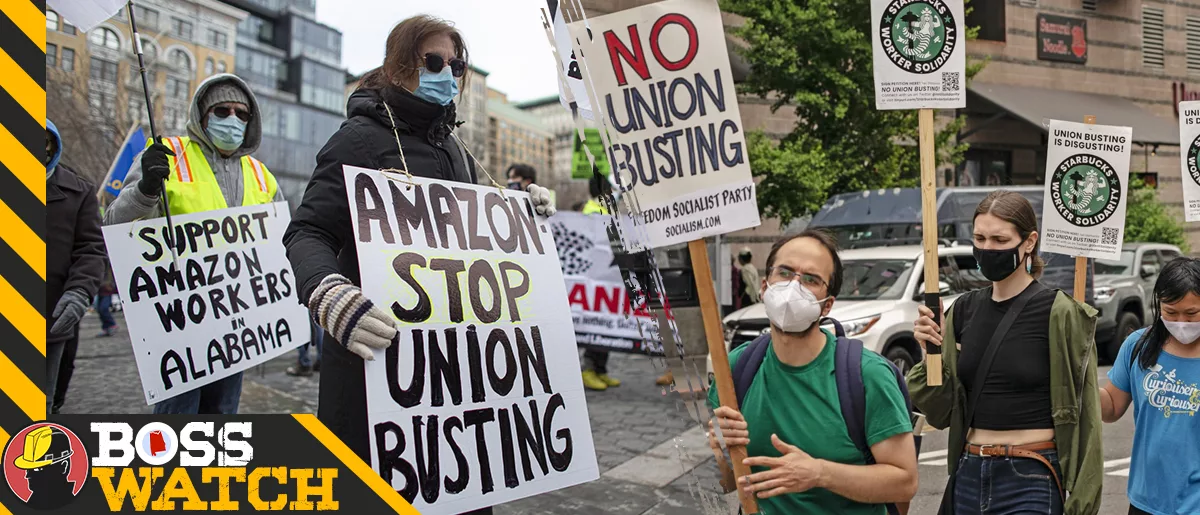Illegal activities of Southern Bosses for the weeks between Friday, July 11, and Friday, July 18
No Enforcement Actions
As we’ve relayed to readers before, the meat of this newsletter has always consisted of press releases from OSHA, the WHD, and the EEOC, documenting enforcement actions against law breaking employers. For yet another week, there were no press releases related to enforcement actions against employers in the South or in the American colonies. And it’s not because bosses are suddenly on their best behavior.
Mississippi Endangerers
This article appeared in full on Mississippi Today and is republished here under a Creative Commons Attribution-NoDerivatives 4.0 International License.
Some residents of a small community in the Mississippi Delta say they fear their health might be at risk after a train derailed and spilled a hazardous chemical compound that burned for hours.
Part of a Canadian National Railway train went off the tracks Saturday in Glendora, about halfway between Memphis, Tennessee, and Jackson, Mississippi. The derailment prompted a temporary evacuation of the village after a tank car containing benzene caught on fire.
Desiree Simmons and Diamond Hoskins said they were leaving work at an Emmett Till museum when they realized they had to take their families to safety. The derailment occurred nearby.
“We came out of the building, and all we heard was a ‘boom,’ and the ‘boom’ was a couple feet down from where we was, and all we saw was black smoke,” Simmons told Mississippi Today.
Benzene is used in several products, including detergents and plastics. Symptoms of benzene poisoning include drowsiness, fast or irregular heartbeat, tremors and headaches.
Local fire departments worked several hours to extinguish the flames, according to the Tallahatchie County newspaper, The Sun-Sentinel. The Mississippi Department of Environmental Quality built a berm around the tank car to contain the spillage and firefighting liquids.
Employees of the Department of Environmental Quality, the state Health Department, Canadian National Railway and the National Transportation Safety Board have been on-site in Glendora, a rural community of about 140 residents.
No buildings or homes were damaged, but the derailment damaged the main water line, which has since been repaired. Glendora was put under a boil water notice – a common practice after water lines break and temporarily lose pressure.
…
Hoskins said people from CN gathered residents in Glendora on Monday and gave each family a $100 Walmart gift card.
Since returning home Tuesday, both Simmons and Hoskins say that they and their children experienced headaches, fatigue and other symptoms. Both said they plan to visit a doctor soon, and both are worried about their families’ health.
…
Mayor Johnny B. Thomas said he believes the evacuation began too late and ended too soon, and the Glendora community isn’t involved enough in the response.
“They did not evacuate us in a timely manner and in an urgent manner as it should have been with this type of chemical exposure,” Thomas said.
In a statement to Mississippi Today, the Department of Environmental Quality said air monitoring began promptly after the incident.
“There have been no detectable levels of benzene found and air quality in the community remains at safe levels,” the department said. “Therefore, initial evacuation orders have been lifted.”
The department said air monitoring continues as a precaution.
“We will release any information where there is a threat to public health or the environment,” the department said.
The railroad company directed Mississippi Today to the National Transportation Safety Board for comment, and the board said it will release a preliminary report within 30 days.
One Sided Transparency
LaborLab, a leading non-profit watchdog that monitors compliance with the Labor-Management Reporting and Disclosure Act (LMRDA), today released a critical new report, “One-Sided Reporting: The Growing Reporting Gap Between Required Annual Union Versus Employer and Persuader Filings and OLMS Compliance Efforts Continues to Widen.” The report, which analyzes 2024 non-filing data as of June 30, 2025, for a third consecutive year, reveals a stark and growing disparity in reporting compliance between labor organizations and employers/persuader consultants.
LaborLab’s comprehensive analysis integrates data from three government-conducted studies: the recently released 2025 Government Accountability Office (GAO) report on union filings, the 2024 Department of Labor’s Inspector General Report, and a 1984 U.S. House of Representatives Subcommittee Report. This first-ever triangulation of data sets provides irrefutable evidence of a significant and widening reporting gap.
Key Findings from the Report:
- Improved Union Compliance: The GAO study highlights a 10% improvement in on-time union report filings over a five-year period, alongside a significant reduction in chronically delinquent reports. This demonstrates the Office of Labor-Management Standards (OLMS)’s capacity to enhance compliance when focused efforts are applied.
- Abysmal Employer and Persuader Non-Compliance: In stark contrast, documentation from the Department of Labor’s own Inspector General reveals a consistently dismal on-time filing rate (and high non-filing rate) for persuader consultants and their engaging employers during the same period. This disparity is particularly alarming given that the number of persuaders is approximately 100 times smaller than the number of union filers.
- Conspicuous Absence of Enforcement: While OLMS has successfully implemented voluntary compliance programs to improve union on-time filing, comparable initiatives for employer and persuader reporting deficiencies have been conspicuously absent, despite the significantly smaller population size and reduced resource requirements.
- Persistent Deficiencies: The report also underscores the widespread failure to provide essential information, such as Employer Identification Numbers (EINs), a deficiency noted as far back as the 1984 House Subcommittee report and reiterated by LaborLab’s recent complaints submitted to OLMS.
LaborLab’s Recommendations to OLMS:
LaborLab urges OLMS to immediately implement the following recommendations to close this critical reporting gap:
- Systematic Identification: Initiate a systematic and consistent effort to identify non-filing persuaders and engaging employers through robust crossmatching of existing data, a methodology recommended since 1984.
- Dedicated Resources: Allocate dedicated personnel within OLMS specifically to ensure the timely filing of LM-10 and LM-21 reports.
- Voluntary Compliance Programs: Establish voluntary compliance programs for persuaders and employers, mirroring the successful initiatives used for unions, and integrate benchmark data into OLMS’s annual reports.
LaborLab has consistently shared its crossmatching spreadsheets, methodologies, and deficiency complaints with OLMS and remains committed to providing its expertise to help correct this glaring discrepancy.
Union Busters
Brought to you by LaborLab: The nation’s leading watchdog standing with working families to stop employer coercion and intimidation. Visit www.laborlab.us for more info.
Here are the new filings from this week:
- The Tustin Group hired the Cummings Group. They did not provide a compensation rate.
- American Rock Products hired Labor Consulting Group at $395/hour.
- Alro Steel Corporation hired Labor Management Associates at $325/hour.
- Medix Ambulance Service hired Davis, Grimm, Payne & Marra at $440/hour.
In addition, the following LM-20s were amended:
- MAJ Consulting Services amended their LM-20 for BlueOval SK to add a compensation rate ($212.50/hour).
As a reminder, due to a lack of enforcement, some labor relations consultants may disregard the law and fail to report their activities to the U.S. Department of Labor. Therefore, it’s crucial for organizers and workers to report suspected “persuader” activity to the U.S. Department of Labor’s Office of Labor-Management Standards (OLMS).
It’s crucial for organizers and workers to report suspected “persuader” activity to the U.S. Department of Labor’s Office of Labor-Management Standards (OLMS). You can reach them via email at OLMS-Public@dol.gov, by calling (202) 693-0123, or by contacting your nearest OLMS District Office.
For assistance, please contact LaborLab at contact@laborlab.us.
